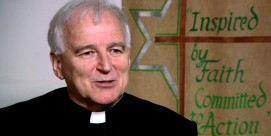Howard Rhodes: On Syria: Just War, Acceptance, and Regret

The United States has decided not to act unilaterally to protect rebellious Syrian communities from the atrocities of the Syrian military. By the time the international community organizes to take remedial action against Syria’s armed forces, the regime’s tyrannical oppression will be largely accomplished.
According to the teachings of the Christian just war tradition, whose norms have been selectively incorporated into international law and secular political morality, the United States has good reasons for rejecting unilateral intervention in this case. By heeding these reasons, however, the president and citizens of the United States accept a terrible cost. The number of Syrians already killed by the Syrian government (well over 7,000, by U.N. estimates) will continue to grow. The degradation of the insurgents will be prolonged.
This situation places American citizens of conscience in a difficult position. Can the United States ever be obligated in justice to refrain from a military action that could save thousands from murder, degradation, and rapine? Is it possible in justice to accept the deaths of so many? The answer, at least for those citizens whose consciences have been formed by the norms and expectations of the Christian just war tradition, is clearly yes. But how are we to think about the consequences of this judgment? For weeks the major national newspapers have included articles about the mounting deaths and suffering of ordinary Syrians. These articles implicitly pronounce a familiar imperative: something must be done. But in the face of this imperative, we are compelled by another: force is justified only where there is reasonable hope of doing more good than harm. How are we to respond honorably to such conflicting imperatives, especially when the human costs are so high?
An exchange last week between Senator John McCain and Secretary of Defense Leon Panetta captures the moral complexity of the situation. In testimony before the Senate Armed Services Committee, Secretary Panetta suggested that a unilateral attack on Syria would cost too much in American lives, in collateral deaths among Syrian civilians, and in future disorder. Senator McCain responded by asking pointedly: “Tell us how long… the killing would have to continue, how many additional civilian lives would have to be lost, in order to convince you the military measures…necessary to end the killing…[are justified]? How many more? 10,000 more? 20,000 more?”
The implication of Senator McCain’s question was clear. When the United States has the military power—particularly, the air power—necessary to stop the tyrant, how callous must we be to refuse to use it on behalf of vulnerable communities devastated by their own government? Secretary Panetta, whom no one would accuse lightly of callousness, responded wearily that such an attack may only be undertaken with a clear view of its probable consequences.
On the terms of the Christian just war tradition, Secretary Panetta’s position clearly has the right of it. Centuries of accumulated Christian moral reflection have taught that a just war requires three things: proper authority, just cause, and right intention. Using force to protect civilians from mass atrocity would undoubtedly constitute just cause. An attack on Syria, however, fails at present to satisfy the other two criteria. There is little consensus at home or abroad that the United States should intervene. The criterion of proper authority is not satisfied simply by widespread approval of an action. Nevertheless, within the contemporary context of international institutions, the criterion requires solicitude toward the judgments of other states. This solicitude is necessary not only to ensure that other states will cooperate by not interfering, but also to ensure that a use of force is perceived as—and is in fact—a contribution to international peace and stability.
While United Nations Security Council resolutions are neither the first nor the last word in political morality, they do function to address this basic concern. Many Americans welcome the concern for international institutions implied by this interpretation of proper authority. The rub is that it will sometimes require binding a benevolent government’s hands by the competing judgments of recalcitrant and self-interested authorities in other states, such as Russia and China.
At a minimum, the requirement of right intention demands that a government actually act upon the just cause that provides the initial justification for war. More broadly, however, the demand for “right intention” places an act of war within the purview of the virtue of prudence. Some Christian thinkers have made the demands of prudence explicit by requiring that a use of force be proportionate, a last resort, and have a reasonable hope of doing more good than harm.
As Secretary Panetta rightly suggests, unilateral intervention in Syria fails the test of prudence. From his testimony, he clearly believes all reasonable political efforts have not yet been exhausted and the prospects of doing more harm than good are very great. In particular, he suggested that intervening in Syria would likely do more harm than good for Syrian civilians, at least for the present moment.
The consequence of this, of course, is that the United States accepts the deaths of the Syrian civilians and rebel fighters currently being slaughtered by their government. It is not an indifferent acceptance, nor even a passive acceptance, but an acceptance all the same. We should not be confused when our president or one of our representatives declares the situation in Syria “unacceptable.” The situation is, of course, unacceptable, yet… And it is here, in this disorienting place where we find ourselves compelled to accept the unacceptable, that we leave the comfortable realm of well-worn moral principles and confront the deeper dimensions of our situation.
The great Christian theologian St. Augustine of Hippo confronted this situation in one way when he laid the foundations of Christian moral reflection on war in the fourth century. Writing in his “Reply to Faustus the Manichean,” Augustine asked, “What is the evil in war? Is it the death of some who will soon die in any case, that others may live in peaceful subjection? This is mere cowardly dislike, not any religious feeling.” Augustine’s view is startling. He suggests plainly, and in a troubling tone, that war is not justified principally to save people from being killed. Such killing is evil, to be sure, and to be prevented when possible. But war is not, on Augustine’s view, a matter of humanitarian intervention. For Augustine, war is justified–if at all–as a means of punishing and containing the lust to dominate that threatens public safety everywhere. This view may sometimes justify what is now called “humanitarian intervention,” but only if such an act justifiably serves public order.
For Augustine and the Christian tradition that descends from him, the slaughter of innocent civilians is just as evil as it seems. These individuals are more valuable in the eyes of God than every hall of government and military monument on the whole earth. But human politics is not a practice born in heaven. It is a practice that takes place within the horizon of a time when the full truth of humankind is, as Augustine might say, clouded by pride and distorted by lust. The most that can be hoped for here is to contain and minimize human degradation by creating a broad public context in which ordinary persons may endure life’s suffering, savor its joys, and confront their deaths in relative peace. The treacheries of human injustice, on this view, cannot be policed all the way down into every poverty-stricken corner of this sad world. And for this reason, Augustine thought, resignation, endurance, and prayer—including lamentation—are practices as important to human social life as any right-minded effort to battle evil with justice.
Augustine and his ilk could embrace this view in part because they believed in a transcendent God who would restore a broken humanity and resurrect the dead. Many Americans cannot accept this view. But surely rejecting this transcendent hope does not leave us only with the view that human effort knows no intrinsic bounds. Many human rights activists argue that any refusal to intervene with force on behalf of the vulnerable is a moral failure. Accusations of callousness abound. Such boundless moralism, however, seems as committed to a transcendental mythos about human moral possibilities as traditional theism.
There is no honorable way to stand before the ghosts of the unjustly dead without shame. Nevertheless, there is admirable honesty in a clear-eyed acknowledgment of limits.
Howard Rhodes has taught at the University of Iowa and is currently is a J.D. candidate at Duke University School of Law. His research interests include the ethics of war, international humanitarian law, and religion and international relations.







